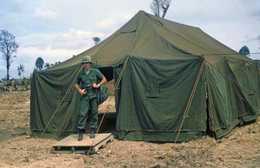 Maj. William H. Wood standing outside his tent at Camp Martin Cox (also known as Bearcat Base) in South Vietnam, December 1966. Wood, a captain in the US Air Force, was stationed in Vietnam from December 1966 to November 1967. He was promoted to major in September 1967. (Alabama Department of Archives and History)
Maj. William H. Wood standing outside his tent at Camp Martin Cox (also known as Bearcat Base) in South Vietnam, December 1966. Wood, a captain in the US Air Force, was stationed in Vietnam from December 1966 to November 1967. He was promoted to major in September 1967. (Alabama Department of Archives and History) Government records from state sources continue to fill in the picture of the Alabama Vietnam experience. The Alabama Department of Archives and History (ADAH) provides access to the correspondence files of Govs. George and Lurleen Wallace and Albert Brewer. The letters--written by mothers seeking information about their sons in Vietnam, soldiers thanking the governors for their support, and citizens demonstrating both support for the war and anti-war sentiments--provide a valuable glimpse into the range of community concerns. While the official records provide an overview of the issues, they often cannot put form and substance to individuals and their specific experiences. This glimpse into a life is best conveyed through the souvenirs, scrapbooks, letters, diaries, and photographs of individuals and families.
The artifact and manuscript materials of the ADAH contain several items that fill out the Alabama story. Slides donated by Alexander City native William Wood, who served in Vietnam in 1967, show his camp, community, and leave experiences. A September 1969 letter home by Dallas County native Johnny Harris captures the basic training experience of new recruits, especially homesickness. The John Caldwell Collection includes photographs of the various military bases he served on as well as Air Force patches, his dog tags, commendation ribbons, and a Zippo lighter engraved with an image of Snoopy and “Viet Nam ’70-’71.” The James Adams United States Marine Corps (USMC) collection contains two pencil sketches of scenes observed during his tour of duty. The Alabama Folk Life Collection includes oral history tapes with members of the Vietnamese community in south Alabama, where many South Vietnamese immigrants settled in 1975. Each collection contributes to the broader knowledge of the era while preserving a sense of its creator’s life.
As part of the national commemoration effort, the ADAH would like to expand its collections documenting the Vietnam era and the lives of Alabamians in those years. Stories of soldiers and nurses; the effects on communities surrounding Fort Rucker, the Anniston Depot, and other military installations in the state; the anti-war movement, especially on university campuses; and life on the home front are all waiting to be told. Help us tell your story to future generations of Alabamians. If you are interested in donating Vietnam-related materials, please contact registrar Sherrie Hamil at sherrie.hamil@archives.alabama.gov. or call (334) 353-4726.
Author
Tracey Berezansky works for the Alabama Department of Archives and History and assists state and local agency staff members in developing retention guidelines and processes for managing official government documents. Core to this work is ensuring the long-term preservation of those official records that tell the story of Alabama.
This feature was previously published in Issue #122, Fall 2016.
 RSS Feed
RSS Feed